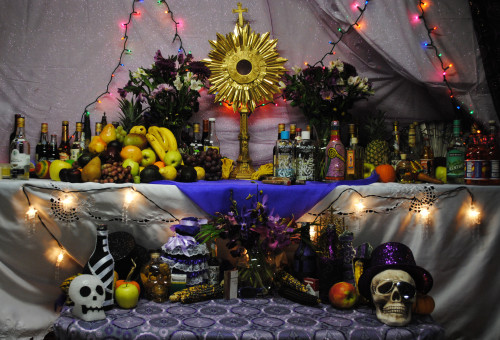MASSACHUSETTS –Two apparently unrelated cases of child torture and murder in this state have been attributed to Voodoo by the perpetrators, which has led to precisely the sort of negative attention in the media that practitioners of African traditional religions seek to avoid.
The word “voodoo” is often used in the mainstream to refer to spiritual practices of the African diaspora that emerged in the Caribbean, and have strong elements of animism and magic use. The practices are also sometimes syncretized with Christianity. That six-letter spelling is mostly associated with Louisiana or New Orleans Voodoo, while practitioners of the Haitian variant prefer to spell it “Vodou” instead.

Haitian Vodou clergy at Swearing in Ceremony Feb 2017 [Aliceba / wikimedia]
However, the two recent Massachusetts-based cases were anything but positive.
In East Bridgewater, a woman who feared her daughter was possessed by an evil spirit brought the girl and her brother to two women to perform a cleansing; the girl’s face was burned so badly by chemicals used that she may never heal. Not far away in Brockton, a woman stabbed her two young sons to death, apparently because a ritual she was attempting had failed.
“There is nothing inherent in Voodoo or Vodou that requires harm to children or adults,” confirmed Lilith Dorsey, who practices New Orleans Voodoo and blogs about it at Patheos Pagan.
“There are negative and insane people in every religion and I fear this is another unfortunate example of this. Because of the necessity for secrecy in the religions, it is often victim to stereotype and misinformation.”
It’s entirely possibly that the adults involved used that word because of associations it has gained in popular culture, rather than any teaching received from a houngan or mambo of the religion. A story in the Brockton Enterprise which summarizes these and some other cases from recent years offers no evidence as to where the subjects received their knowledge.
As is the case with many Pagan religions, there is no central text or source of knowledge that lays out the ethics and practices here; this is a tradition of oral instruction.
Dorsey said that it’s critical to understand quite a bit about whoever is going to be giving that instruction, the “godparent” of the student. In one post about choosing godparents she recommends asking about lineage, learning about expectations, and meeting other godchildren before deciding on a godparent.

A Vodou altar [Photo Credit: Calvin Hennick / Wikimedia]
In the other story, Peggy LaBossiere and Rachel Hilaire told police they had many years’ experience performing “cleansing baths,” which included rubbing oils and salt, as well as resins, on clients’ bodies as they prayed. The women had been entrusted with the two children of LaBossiere’s hairdresser and asked to use their knowledge to expunge a spirit from the young girl.
In this case, whatever they rubbed on the child caused disfigurement; they also cut the girl, blew fire on both the children, and threatened to decapitate the boy if he disobeyed, according to reports.
As Fox News has reported, “It is not clear whether [Sanders] is a follower of Haitian Vodou.”
That Fox article brings forth the voices of several Massachusetts practitioners who echo Dorsey’s own words: the harming of children is never acceptable and these instances do not represent what happens during the course of legitimate practice.
The story in the Enterprise similarly lists a woman whose estranged husband “used Voodoo as a scare tactic” before murdering her, a teen boy who attempted to kill a neighbor he suspected of using a “Voodoo spell on him,” and woman who “waved a metal skull and swung a machete at police while yelling, ‘I do Voodoo. I am from Haiti.'”
Lou Florez considers himself an outsider, as he is not initiated into any of these traditions, but noted that “after fifteen years in community with mambos and houngans that I have never heard nor seen of this practice, as well as, that there are huge spiritual taboos against child abuse and mistreatment with all of the houses that I have interacted with or visited.”
While this is not what the religion is about, Dorsey said that “most people believe it is better not to publicize these atrocities. People wish to drag Voodoo down to the lowest common denominator. I never get asked to comment or report on the good that Voodoo, Vodou, and Santeria communities do.”
The Wild Hunt is not responsible for links to external content.
To join a conversation on this post:
Visit our The Wild Hunt subreddit! Point your favorite browser to https://www.reddit.com/r/The_Wild_Hunt_News/, then click “JOIN”. Make sure to click the bell, too, to be notified of new articles posted to our subreddit.